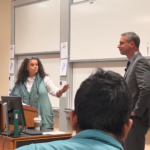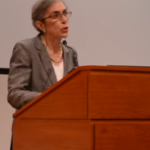Academia’s Ethical Lapses
Last Friday [Nov. 6] disgraced former New York Times reporter Jayson Blair spoke to students at Washington and Lee University’s Journalism Ethics Institute on the subject of “Lessons Learned”.
As my colleague Danny Glover showed in his recent blog post Blair seems largely unrepentant for his actions and shifts most of the blame not on his own lapses in ethical behavior to his superiors at the Times and the cultural shift in the newsroom that valued speed above accuracy.
For someone who was paid $3,000 plus expenses to talk about ethics Blair spoke very little about the subject and seemed to want to use the opportunity to paint himself in a more favorable light and a victim rather than the perpetrator that he is.
But the real blame goes to W & L’s Journalism and Ethics Professor Ed Wasserman a former journalist for arranging the Blair appearance even though he admitted that it would be a departure from their usual slate of “heroes…of great accomplishment and stature”.
Is this the beginning of a parade of ethically challenged former journalists that Wasserman wants to put on display? Why doesn’t he track down and find Janet Cooke the former Washington Post reporter who in 1980 fabricated the story of an 8-year old heroin addict and won a Pulitzer Prize for her efforts. Maybe he could get The Post’s then Executive Editor Ben Bradlee to lecture on how an experienced newsman like himself could be duped by a young journalist and how he felt when it was discovered that he had nominated a made up story for a Pulitzer.
Yet for all the lapse in judgment by Wasserman to bring Blair to his small university it pales next to Harvard’s decision to ask none other than former New York Governor and Attorney General Eliot Spitzer to address students as part of the university’s public series examining ethical issues in public life.
Spitzer was invited by Harvard professor Lawrence Lessig who is the director of Harvard’s Edmond K. Safra Center for Ethics who told the New York Times that the former governor was asked to speak on what made him famous- policing Wall Street and not the prostitution scandal that ended his tenure in office.
As the Attorney General Spitzer was relentless in pursuing what he saw as wrongdoing on Wall Street and became a hero to many small investors even though many questioned his tactics at the time.
Just like the Jayson Blair appearance at Washington and Lee last week this appearance seemed to be more directed at rehabilitating Spitzer (there are rumors he may run for governor) than to discuss his own lack of ethical behavior. Lessing wants to separate Spitzer the AG from Spitzer the Governor but he knows fully well that that is one and the same person and to have him speak on ethics is a slap in the face to anyone who believes that ethics is actually important.
I think Wasserman and Lessig should rename their respective Institute and Center to add the words politically correct to more properly reflect their views on ethics.
Don Irvine is the chairman of both Accuracy in Media and Accuracy in Academia. This column originally appeared on the AIM website.




